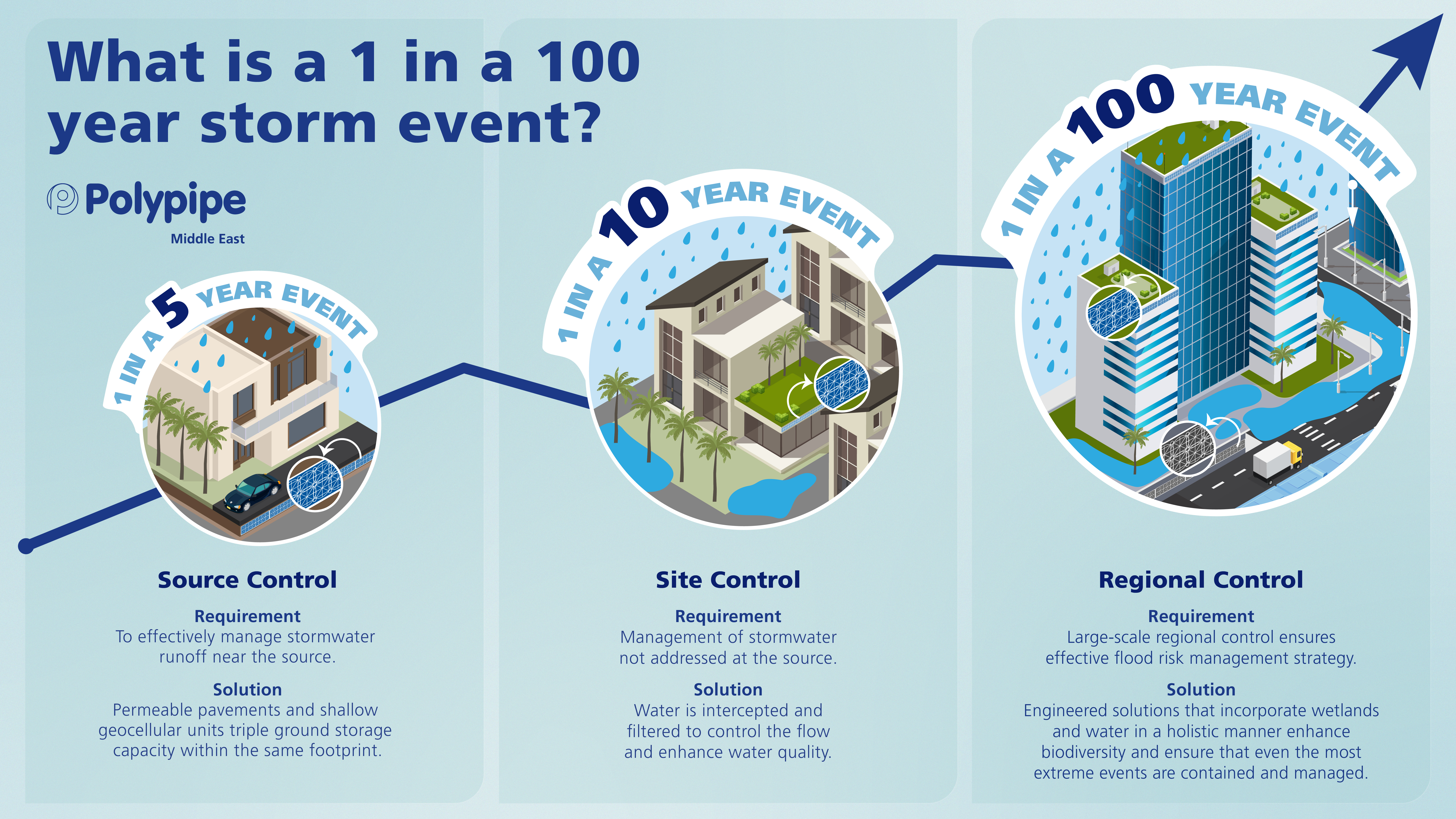Revolutionising Stormwater: Maximising Rain Harvest During Rainy Seasons!
Friday 31st May 2024

In recent months, nations across the GCC region have experienced unprecedented rainfall. In just 24 hours, Dubai alone witnessed more rain than the desert city normally faces in 1.5 years. Waters reached more than 142 mm (5.59 inches), flooding streets and bringing daily life to a temporary standstill.
This extraordinarily heavy rain, which surpassed any documented rainfall since records began in 1949, is considered by experts to be a 1 in 100 years phenomenon – but we cannot rule out the possibility of such events happening again in the near future.
So, when nature teaches us to expect the unexpected, how can we also harness its power to better serve our resource needs? How can we repurpose surplus stormwater for the safety – and benefit – of businesses, building occupants and biodiversity? And, when storms do occur, can these measures solve wider challenges surrounding regional water scarcity?
The Opportunity
In the wake of the storms, both the UAE’s federal and regional governments, as well as private real estate companies, have stepped in to provide ongoing support for those affected. The UAE’s Prime Minister and Ruler of Dubai, His Highness Sheikh Mohammed bin Rashid Al Maktoum, has also reflected on both the positive outcomes and learnings that can be gathered from the storm:
“The exceptional weather event turned out to be a blessing for us. The dams filled up, the valleys flowed with rainwater and the underground water reserves replenished. We learned significant lessons on managing heavy rains in our cities, identified areas for development and enhanced our readiness and preparedness, making us better prepared for the future.”
Sheikh Mohammed’s response reflects the importance of turning what could be considered a challenge into an opportunity. In the typically hot, arid climate of the GCC region, such downpours provide the chance to trap, conserve and repurpose water resources, to ensure civilian safety when storms do occur while also encouraging sustainable water management.
It all comes down to ensuring that the most effective long-term stormwater and wastewater management solutions are in place.
How can we Harvest Rainwater?
In high-density city environments, natural Sustainable urban Drainage Systems (SuDS), such as natural swales, ditches and ponds, are capable of managing rainwater. However, in more severe weather, they can become less effective. With the inclusion of below-ground SuDS systems, which mimic natural drainage to channel excess water back into the soil, surface water flooding can be reduced. This means that, rather than seeing rainwater as a waste product that needs to be disposed of, it can be captured, treated, stored and reused. This approach to infiltration minimises flooding, reduces the strain on drainage systems and prevents stagnation on the surface, while also ensuring that groundwater reserves are recharged.
Polypipe Middle East’s range of drainage solutions is tailored to effectively mitigate surface water flooding through effective, controlled retention, attenuation and infiltration at source and further afield. This helps to protect infrastructure and communities. We focus on providing solutions that mitigate the need for extensive construction or an abundance of piping to be implemented by controlling water at the source.
For example, Polypipe Middle East’s BBA-approved Polystorm geocellular water management systems are the most secure and sustainable way to alleviate the risk of flooding. Each geocell features a 95% void ratio, enabling it to store up to 190 litres of water.
The structure is wrapped in a non-permeable, geomembrane which can receive rainwater collected from roof gutter systems or surface drains. It can also be modified to release the water either within a set discharge limit (attenuation) or, where soil conditions allow, be wrapped in a permeable geotextile and slowly release the water back into the surrounding soil (soakaway).
Designed for non-trafficked, trafficked and heavy-trafficked applications, its modular design also means that one system can be built up to form a structure of any shape or size, making it ideal for a wide range of use cases.
Polystorm also benefits from a 50-year design life, after which the structure is 100% recyclable.
Whilst Polystorm is more suitable for deeper applications, Polypipe Middle East’s Permavoid system provides robust retention, attenuation or infiltration at shallower depths for effective source control. This approach focuses on managing surface water at source, and as close to where the water falls as possible. In the Middle East, such systems may be implemented when an unusually high water table is present, or when the site ground presents other challenges for deeper excavations. This also makes Permavoid well-suited to applications such as rooftop amenities and cooling urban environments. Additionally, because Permavoid allows water to be spread across a wider area, its installation can also minimise the cost associated with excavation work.
Why Should We Harvest Rainwater?
From permeable pavements to green roof systems, water management solutions such as SuDS can make a real difference to stormwater outcomes – in both the short and the long term.
There are four pillars of SuDS, each centred on the principle that the design should maximise potential benefits: water quantity (to mitigate flooding risks and support natural water cycles), water quality (to prevent pollution), amenity (how this water can be leveraged to create and sustain better places for people) and biodiversity (how this water can be leveraged to create and sustain better places for nature).
Water Quantity
Smart water management solutions can help to overcome water supply challenges in arid regions by mimicking the natural flow of the earth’s water cycle – even during prolonged dry spells. Through passive irrigation, these systems can replenish groundwater reserves and sustain plant life sustainably, contributing to water conservation efforts and supporting the natural ecosystem in water-scarce environments.
Water Quality
In stormy weather, traditional drainage systems can lead to water pooling. In flood conditions this water quickly becomes stagnant, breeding harmful bacteria and mosquitoes. More advanced stormwater drainage solutions, such as SuDS, ensure a safer environment by preventing water stagnation and reducing the risk of pollution. By providing the infrastructure for stormwater to filter naturally through soil and vegetation, this infiltration process removes pollutants and sediments from the water, resulting in cleaner waterways.
Amenity
Water management solutions can also be leveraged to power agritech innovation, such as vertical farming. This reduces the need for traditional water-intensive irrigation and provides the potential solution to regional food supply challenges, all while minimising carbon footprints from fresh food imports.
These solutions can also support a more comfortable lived environment. Traditional impermeable surfaces such as concrete and asphalt absorb and retain heat, leading to higher temperatures – otherwise known as the urban heat island (UHI) effect. However, SuDS techniques such as green roofs and permeable pavements help reduce surface temperatures. Green roofs, for example, act as natural insulators, reducing the heat absorbed by buildings and contributing to cooler, healthier and more liveable cities.
Biodiversity
In the long term, sustainable stormwater management solutions can also contribute towards a stronger ecosystem. By storing and infiltrating rainfall, SuDS mitigate flooding and erosion, to encourage greater biodiversity while also improving soil fertility.
However, these solutions can also contribute towards wider climate goals. Traditional irrigation systems often require significant energy inputs for pumping and distribution, contributing to greenhouse gas emissions and environmental degradation. In contrast, SuDS provide zero-energy irrigation solutions, reducing reliance on energy-intensive water management methods and promoting environmental sustainability.
While flooding and stormy weather can disrupt daily life, we shouldn’t consider the water itself a nuisance – instead, we should reconsider how we can best optimise our water management systems to make the most of this precious resource. By prioritising solutions which encourage greater biodiversity, sustainable farming practices and greener, cleaner, healthier cities, we can build a more resilient and water-secure future for generations to come.
For more information on how we can help catch, treat, store and reuse rainwater in the most ideal way, contact us today.
Tel: +971 (0) 4 518 3000
Email: middleeast@polypipe.com

